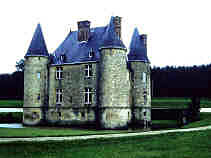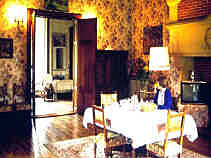BREAKFAST INTHE CHATEAU |
|
Harlan Hague |
The day did not begin well at all. My wife and I arrived at noon in Thionville in northern France by train from Trier. I called the local Europcar agency to ask for directions. Before leaving the United States, I had booked through Auto Europe.
No answer. I stepped outside and called a taxi. The taxi and a driving rain arrived together. We piled our luggage into the taxi and drove to the Europcar agency. It was closed.
We finally left Thionville about 6:00 p.m. in an Avis rental. After unrewarding calls to three Europcar offices in France and one to Auto Europe in the United States, I had caved in and booked a week's rental with Avis at almost twice the cost of the Europcar rental. (Personnel at all three agencies were sympathetic and helpful, and the story has a happy ending. The Avis car performed beautifully, and Auto Europe arranged a refund of the difference between the Avis and Europcar charges.)
As I drove west from Thionville toward Stenay, my auto-rental anxiety gave way to accommodation-anxiety. Dusk was approaching, we were hungry, we could not reach Rouen that evening, and I didn't know the region. So much for well-laid plans.
We looked in the villages and countryside for that happiest of signs: "Chambre." But we saw none, which was strange. We generally have no trouble finding pleasant accommodation, anywhere in France. Then near Buzancy, a roadside sign caught my eye as we passed. It pointed leftward to the Chateau de Landreville. On the same post, below the chateau sign, a small sign said simply: "Chambre d'Hote."
I made a U-turn and pulled up at the sign. Five kilometers, the chambre d'hote sign said. Worth a look. It was almost dark.
I drove about a kilometer to a small village, turned down a road toward a hamlet, hoping it was the right turning, through the cluster of houses and barns, then down a narrow lane in a landscape of green fields and hedgerows. The road narrowed. Finally, on the right, there was the castle. A plaque beside the entrance identified it as eleventh- century.
I looked around. There was only the castle and the land and the fields. The odometer read five kilometers. But no chambre d'hote.
 I drove slowly up the lane toward the chateau, the gravel drive crunching
like crusted snow. I stopped in the courtyard. A woman who was tending flowers in front of
a cottage stood and walked over, smiling. I got out of the car and asked if she could
direct me to the chambre d'hote.
I drove slowly up the lane toward the chateau, the gravel drive crunching
like crusted snow. I stopped in the courtyard. A woman who was tending flowers in front of
a cottage stood and walked over, smiling. I got out of the car and asked if she could
direct me to the chambre d'hote.
"Ici, monsieur," she said, pointing to the castle. It was a small, moated jewel. A bit stunned, I nevertheless asked the price: $175 for a turret room, a bit less for a room on an upper floor.
Not outrageous for accommodation in a delightful medieval chateau, but it would be a budget-buster for us. I explained and thanked her and turned to leave. She called me back and said that there was the house of the marquis's mother.
Adjacent to the moat, the dower house was not so old and therefore not so dear at $78. In fact, it was an exquisite two-story, eighteenth-century country house. We took it.
The woman asked me what time we would like breakfast. I told her and asked where it would be served.
"Le chateau, bien sur," she replied.
Our room in the dower house was enormous, with a high domed ceiling.
The rich antique furniture complemented the rose, ivory, and green interior, but hardly
filled the room. The regal bed, with a headboard of pink satin, was covered with a
cream-colored taffeta-like comforter. The view from the front window was all green lawn,
towering broadleaf trees, and lush meadows beyond. The bathroom was family-size.
The next morning, we crossed the moat on
the footbridge. My wife was wearing a skirt for the first time on this trip. And
stockings. Our hostess from yesterday was waiting at the door, still smiling. She
introduced herself. She was the Marquess de Landreville. She personally served us
breakfast in the large dining room. We felt privileged indeed; we were the only guests.
The tableware, golden cutlery, and gold and silver coffee and tea service had been in the
marquis's family for centuries.
After breakfast, the marquess showed us around the chateau and told us something of its
history. It had not escaped the violence of the wars that have regularly swept  across northern France, from the Middle Ages through the Second
World War. Portions of the chateau have been restored and rebuilt.
across northern France, from the Middle Ages through the Second
World War. Portions of the chateau have been restored and rebuilt.
The next morning, as we packed the car, the marquis and marquess walked over. We talked about traveling, the attractions of northern France, and the joys and obligations of inheriting a small, historic chateau. They told us that they have few American guests and seemed pleased that we had found the chateau interesting.
We drove away, with spirits lifted. I marveled that only yesterday I had expended considerable energy fretting about a rental car. Those who travel with an open mind, a strong heart, and few obligations, will be rewarded.
Old clichés notwithstanding, the most memorable experiences are often the unplanned ones.
To book a room at the castle or dower house, write to the Chateau de Landreville, 08240 Bayonville/Buzancy, France. Or call 24.30.04.39. If you telephone, be prepared to speak French. The marquis and marques either do not speak English, or they were willing to tolerate their guest's imperfect French.
|
Caveat and disclaimer: This is a freelance travel article that I published some time ago. Some data, especially prices, links and contact information, may not be current. |
|
|
|
|